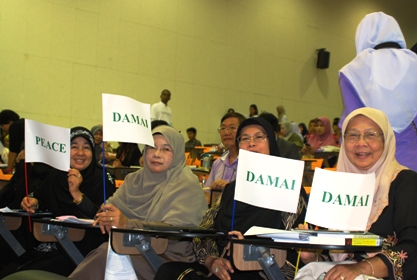Peace flowers blossom although actual peace talks are yet to start
February 28 marks the second anniversary of the start of peace talks in Kuala Lumpur between the government of Prime Minister Yingluck Shinawatra led by Lt-Gen Paradorn Pattanathabut and separatist groups led by Hassan Taib of the Barisan Revolusi Nasional.

Although the talks have failed to reach any concrete agreement largely due to the fact that both sides were not ready then for the talks, the effects from this initiative have prompted the government of Prime Minister Prayut Chan-ocha to carry on with the talks and make it a national agenda.
Nevertheless, there have been no tangible progress about the talks which are yet to start apparently because the government side does not want to repeat the mistakes of the last government and wants to close the loopholes.
But on the side of civic society and people’s sector, it appears that the flowers of peace have blossomed as manifested in the various activities which have taken place in the restive region.
Last year, the Peace Centre for Southern Border Provinces was set up in Pattani by the Centre for Peace Education and Development of Mahidol University.
Gothom Arya, advisor of the CPED, said that the Pattani’s centre aims to be a safe and central space for all peace activities and to carry on with more than 50 projects initiated in the region by the CPED.
The Pattani’s centre three main responsibilities are to build trust and to communicate with the society, to encourage cooperation and learning and to open up space for expressions.
Another significant activity is the establishment of the Women of Faith for Peace movement to encourage women’s participation in solving problems in the region, including peace process.
The recently concluded peace march from Yala through Pattani to Narathiwat by a small group of activists is another example of peace-related activities.
Patani Forum is another civic society’s organization which recently presented a study on public policy regarding the role of the mainstream and alternative media in the promotion of peace. The study shows public’s wish for mainstream media to be impartial in their presentation of news about the restive region and to focus more on in-depth reporting rather than flash news on violent incidents.
Regarding media development, the Prince of Songkhla University’s Pattani campus has planned to set up the Centre for Peace Communication Education and Development to promote the role of the media in peace promotion.
Dr Srisompob Chitpiromsri, director of South Watch Centre, said the revival of peace talks would help ease violence but it is yet to be seen when the talks will start and go toward which direction.
